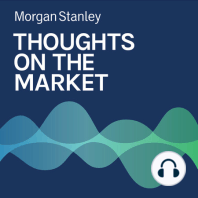3 min listen

Mike Wilson: Why Have Stocks Been So Weak?
Mike Wilson: Why Have Stocks Been So Weak?
ratings:
Length:
4 minutes
Released:
Dec 6, 2021
Format:
Podcast episode
Description
The past few weeks have seen weak valuations across equity markets. While many look to the Omicron variant as the main culprit, the correction may have more to do with the recent Fed pivot.----- Transcript -----Welcome to Thoughts on the Market. I'm Mike Wilson, Chief Investment Officer and Chief U.S. Equity Strategist for Morgan Stanley. Along with my colleagues, bring you a variety of perspectives, I'll be talking about the latest trends in the financial marketplace. It's Monday, December 6th at 2:30 p.m. in New York. So let's get after it. While there's evidence the past few weeks have been rough for equity investors, there's a lot of debate around why stocks have been so weak. To us, it seemed like too much attention had been put on the new COVID variant, Omicron, as the primary culprit. Our focus has been much more on the Fed's more aggressive pivot on tapering asset purchases. Last Tuesday, Fed Chair Jay Powell told Congress that it was time to retire the word 'transient' when talking about inflation. This was a significant change for a Fed that had been arguing inflation would likely settle back down next year as supply chains adjusted to the increased demand. As a result, the Fed is now likely to reduce its asset purchase program - known as quantitative easing, or QE - twice as fast as it had previously told us. In short, we now expect the Fed to be completely done with its QE program by the end of March. That is quite a speedy exit in our view and is likely to leave a mark on asset prices. Hence, the sharp correction in stocks last week, especially the most expensive ones. Importantly, this move by the Fed is very much in line with our mid-cycle transition narrative that regular listeners should recognize. From an investment standpoint, the most important thing one needs to know about the mid-cycle transition is that valuations typically come down. In S&P 500 terms, it's typically 20%. So far, we've seen valuations come down by only 10%, making this normalization process only about halfway done, at least at the index level. The good news is many individual stocks have gone through a derating of much greater than 20% already. The bad news is that while some of the most expensive stocks have been hit the hardest, they still look expensive when normalizing for the period of over-earning these companies enjoyed in 2021. Sectors we think look particularly vulnerable include consumer discretionary and technology stocks. Sectors that look cheap are health care and financials. Another consideration for investors is the fact that this White House appears to be more focused on getting inflation under control, rather than keeping the stock market propped up. This might give the Fed cover to stay the course on its plans to withdraw policy accommodation more aggressively. In other words, investors should not be so confident the Fed will reverse course quickly if stocks continue to wobble into year end. Finally, the new variant can't be completely ignored and does pose a risk to demand. However, we always expected another big wave of COVID this winter as the cold weather set in. In fact, the recent spike in cases in the US are almost exclusively the Delta variant. In other words, we would be seeing this spike with or without Omicron's arrival. This is one of the reasons we've been expecting demand to disappoint in the first quarter and another thing that markets will have to deal with as we go into next year. Bottom line, expect markets to remain volatile into year-end as investors are forced to chase and de-risk depending on the price action. In short, moves up and down will be accentuated by asset managers trying to keep up with their benchmarks. In such an environment, we recommend investors continue to keep their risk lower than normal with a focus on large cap quality stocks trading at a reasonable valuation. We expect that over the next three to four months, markets will give us a much fatter pitch to swing at as the Fed comp
Released:
Dec 6, 2021
Format:
Podcast episode
Titles in the series (100)
Andrew Sheets: For Markets, Signs, Signs, Everywhere Signs by Thoughts on the Market